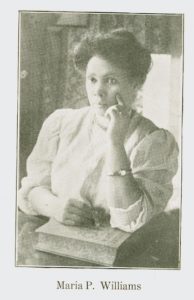
Maria Thurston Williams
*Maria Thurston Williams was born on this date in 1866. She was a Black teacher, editor, actress, and film producer.
Maria Priscilla Thurston was from Kansas City, Missouri. Williams was a one-time schoolteacher with a history of activism, independence, and interest in the liberal arts. This interest led her first to newspapers, film production, scriptwriting, and acting and finally to memoir with her 1916 book My Work and Public Sentiment. She identified herself as a national organizer and speaker with the Good Citizens League. She stated that ten percent of the proceeds would go to suppressing crime among African Americans.
Thurston served as editor-in-chief (1891–1894) of the Kansas City weekly New Era. This spurred her to seek greater independence by founding, writing, and editing her newspaper, the Women's Voice (1896–1900), "sponsored by the 'colored women's auxiliary of the Republican party. In 1916, Thurston went on to publish her memoir. In 1916, she married entrepreneur Jesse L. Williams, who owned a movie theater and several other businesses in Kansas City.
The pair co-managed the movie theater, giving the couple experience distributing and releasing films for black audiences. Williams served both as the company's secretary and treasurer. The couple co-founded Western Film Producing Co. and Booking Exchange, and Williams went on to write the script for Flames of Wrath, produce a film from the script, and play the role of prosecuting attorney in the five-reel film. She was the first Black woman film producer for the silent crime drama The Flames of Wrath in 1923. That same year, Williams' husband died, and she soon married another man.
Maria Williams died on January 3, 1932, after being called away from her home by a stranger who requested help for his ill brother. She was shot to death on the side of a road several miles from her home. The murder remains unsolved. Ironically, the plot for "Flames of Wrath" concerns investigating a murder after a robbery. Aimee Dixon Anthony stated that Williams could also reasonably be considered the film's director, given how undifferentiated the two roles were at that time. That distinction is typically granted to Tressie Souders, the director of 1922's A Woman's Error.
To Become an Animator
To Become a Media Producer or Director